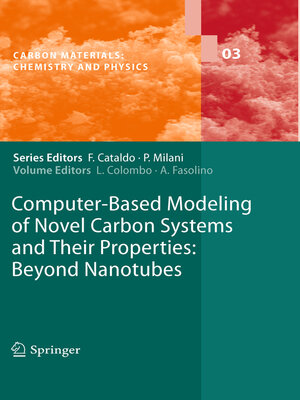Computer-Based Modeling of Novel Carbon Systems and Their Properties
ebook ∣ Beyond Nanotubes · Carbon Materials: Chemistry and Physics
By Luciano Colombo

Sign up to save your library
With an OverDrive account, you can save your favorite libraries for at-a-glance information about availability. Find out more about OverDrive accounts.
Find this title in Libby, the library reading app by OverDrive.



Search for a digital library with this title
Title found at these libraries:
| Library Name | Distance |
|---|---|
| Loading... |
During the last twenty years, the multiplicity of potential carbon structures has consistently posed a formidable challenge to theoretical and computational physicists. Several different methods are currently being used to study the structure and the properties of such systems. These methods include simulations based on empirical potentials, tight-binding calculations and density functional theory (DFT). A combination of these methods is needed to make significant progress in the carbon field.
This volume provides the reader with a survey of state-of-the-art theoretical and computational contributions featuring novel carbon systems (excluding nanotubes). The chapters are authored by leading researchers who are all actively involved with different aspects of carbon structure and property elucidation. Consequently, a variety of methods are presented to the reader. The editors have successfully compiled an informative book that:
Computer-Based Modeling of Novel Carbon Systems and Their Properties is aimed at advanced undergraduates, graduates, and researchers with an interest in computational nanomaterials.







